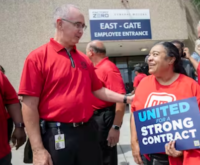The Movement to Abolish Columbus Day is Picking Up Steam
By Carimah Townes
Think Progress, October 12, 2015 — Every year on the second Monday of October, millions of Americans get a day off from work in honor of Christopher Columbus’ “discovery” of America in 1492. The day is always a controversial one, as it glorifies a man who launched a large-scale genocide and European colonization.
But instead of celebrating Columbus, more cities than ever are choosing to commemorate Indigenous People’s Day this year. By remembering the history of native peoples, Albuquerque, Portland, St. Paul, and Olympia join at least five other cities shedding light on a population that still feels Columbus’ impact, centuries after his arrival.
For years, Native Americans have pressured local governments to acknowledge the mass atrocities committed by Columbus and flip the script by honoring indigenous groups’ contributions to the country instead. Efforts of tribal leaders in Olympia last year resulted in the city council formally recognizing Indigenous People’s Day. Albuquerque passed a similar resolution in 2014, but it will observe Columbus Day simultaneously. Portland tribes have pushed for a day of recognition since 1954. St. Paul has replaced Columbus Day altogether.
The cities — joining smaller ones in Oklahoma, Texas, and Michigan — are following in the footsteps of Berkeley and South Dakota, which stopped celebrating Columbus Day in the 1990s. South Dakota has observed Native American Day on the same Monday since 1990. In 1992, Berkeley celebrated the first Indigenous People’s Day on record. Last year, city councils in Seattle and Minneapolis voted to recognize Indigenous People’s Day, and the state of Washington no longer observes Columbus Day at all.
The Movement to Abolish Columbus Day is Picking Up Steam

The Movement to Abolish Columbus Day is Picking Up Steam
“Reclaiming the second Monday in October as Indigenous People’s Day makes a powerful statement,” said Chair Deborah Kafoury of Multnomah County, Oregon. “It says, ‘We are no longer going to celebrate a time of genocide, but instead we will honor the land we live on and the people who have been here since the beginning.”
Tribal Chairman Reyn Leno of the Confederated Tribes of Grande Ronde in Portland share the same sentiment. “We’ve been here for hundreds of thousands of years, and we’ve been shy about telling our own story,” he said. “I think that has led the public to have a lot of interest in what we do.”
While the celebration of Indigenous People’s Day marks a significant victory, Native Americans are negatively impacted by Columbus’ legacy.
Today, 25 percent of Native Americans live in poverty, and economic conditions on reservations are even more dire. Due in large part to slashed federal education funding on reservations, native students have not yet closed the achievement gap the way other people of color have with their white peers. Native Americans have a shorter life expectancy than the rest of the population. They are disproportionately represented in the criminal justice system. And they are still treated as mascots and called derogatory names by major public figures.
www.thinkprogress.org/justice/2015/10/12/3711539/indigenous-peoples-day/









